Books
Books
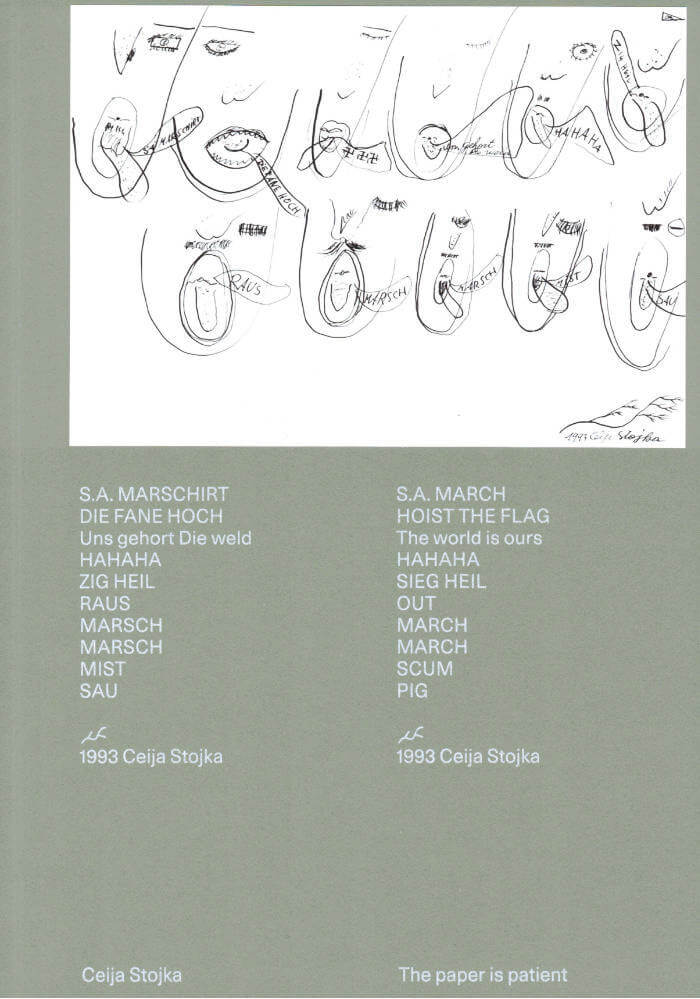
The Paper is Patient
The work of Ceija Stojka (1933-2013) is considered today an invaluable testimony on the deportation and the holocaust of the Romani people during the Second World War. For the very first time, this publication considers equal to her graphic work the notes she wrote on the back of her drawings and paintings. Stojka's particular use of language, phonetically adapted from her knowledge of German, is here transcribed and translated into English, while giving access to both sides of her works.
Published on the occasion of the eponymous exhibition at Malmö Konsthall in 2021.
Ceija Stojka was born in 1933 in Austria to a family of Romani horse traders, the Lovaras. She was still a child when the nazi racial laws drove her into the hell of the concentration camps for 24 months. As a survivor, she covered up this trauma with a heavy silence for almost 40 years. In the 1980s, facing other tragic circumstances in her life, the denial of the Romani holocaust and the resurgence of extreme right-wing racist ideas in Austria, she felt an urgent need to testify. She wrote at first, then started to draw and eventually found her way by blending the two as a self-taught artist. She calls upon us, through her visions of childhood, to never turn a blind eye on what happened, and to remain vigilant as to what may emerge again. Ceija Stojka died in 2013 in Vienna.
Edited by François Piron.
Texts by Ceija Stojka, Noëlig Le Roux, Irka Cederberg.
Graphic design: Coline Sunier & Charles Mazé.
Published in February 2021
English edition
21 x 29,7 cm (softcover)
168 pages (105 ill.)
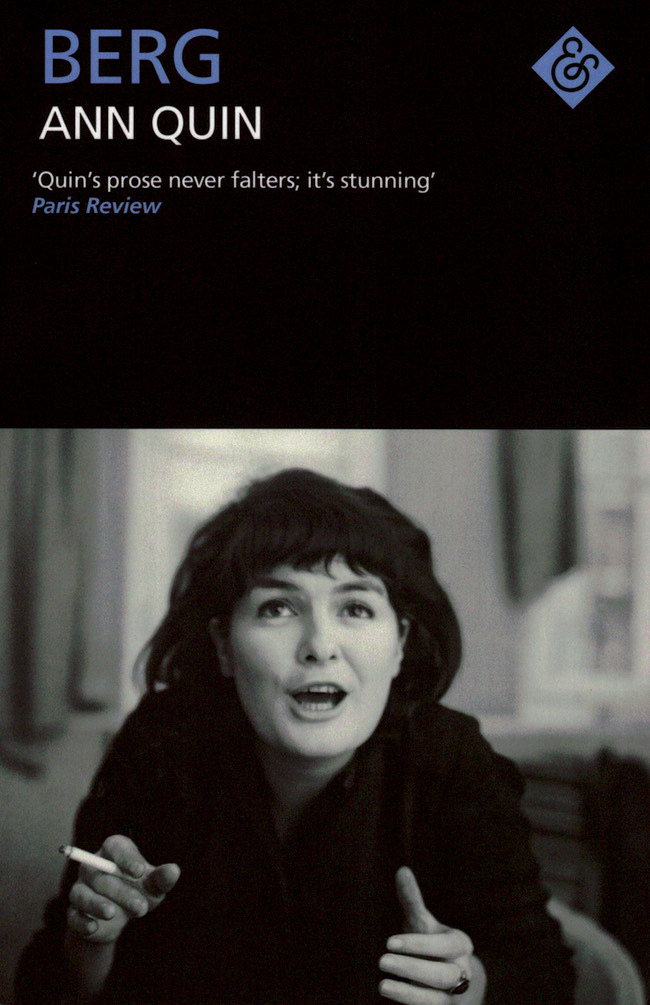
Berg
"A man called Berg, who changed his name to Greb, came to a seaside town intending to kill his father. . ."
So begins Ann Quin's madcap frolic with sinister undertones, a debut "so staggeringly superior to most you'll never forget it" (The Guardian). Alistair Berg hears where his father, who has been absent from his life since his infancy, is living. Without revealing his identity, Berg takes a room next to the one where his father and father's mistress are lodging and he starts to plot his father's elimination. Seduction and violence follow, though not quite as Berg intends, with Quin lending the proceedings a delightful absurdist humor.
Anarchic, heady, dark, Berg is Quin's masterpiece, a classic of post-war avant-garde British writing, and now finally back in print after much demand.
Ann Quin (b. 1936) was a British writer from Brighton. She was prominent amongst a group of British experimental writers of the 1960s, which included B.S. Johnson. Prior to her death in 1973, she published four novels: Berg (1964), Three (1966), Passages (1969), and Tripticks (1972). A collection of short stories and fragments, The Unmapped Country (edited by Jennifer Hodgson) was published by And Other Stories in 2018.
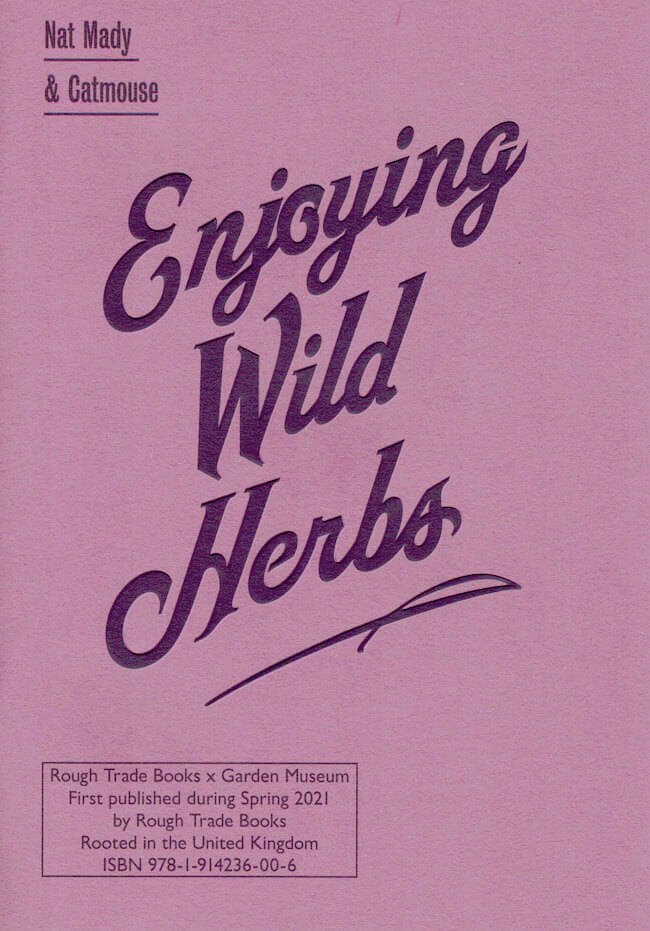
Enjoying Wild Herbs: a seasonal guide
Enjoying Wild Herbs: A Seasonal Guide brings Hackney Herbal’s Nat Mady and illustrator Catmouse together to introduce the wonderful world of herbs. Asking important questions about the nature of public and private space, of how we live alongside plants, how we use them, how we gather them, this is a treatise on how foraging and the knowledge that underpins it can be a radical act—an act that informs much of our attitude to the natural world, to the food we eat and to how we value the multitudinous life that surrounds us.
Published Spring 2021.
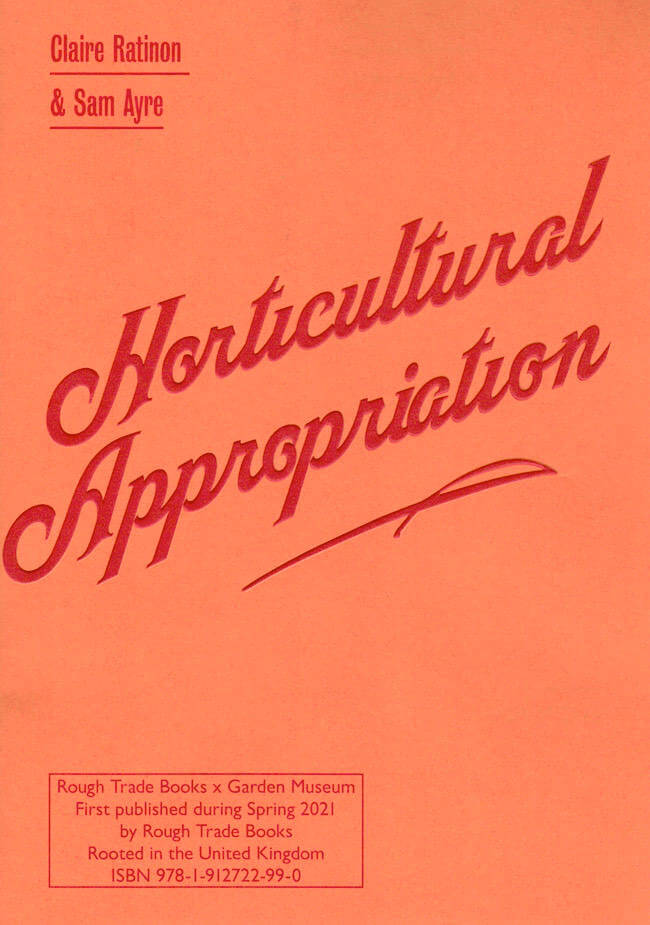
Horticultural Appropriation
Horticultural Appropriation is a conversation between an organic food grower and an artist about the possibility and necessity of bringing a decolonial lens to the practice of horticulture. Taking place within West Dean Art College and Gardens, the exchange explores how attempts to decolonise collections and spaces currently happening in arts and cultural institutions might inform the interrogation of the colonial history at the heart of Britain's gardens and gardening.
Published Spring 2021.
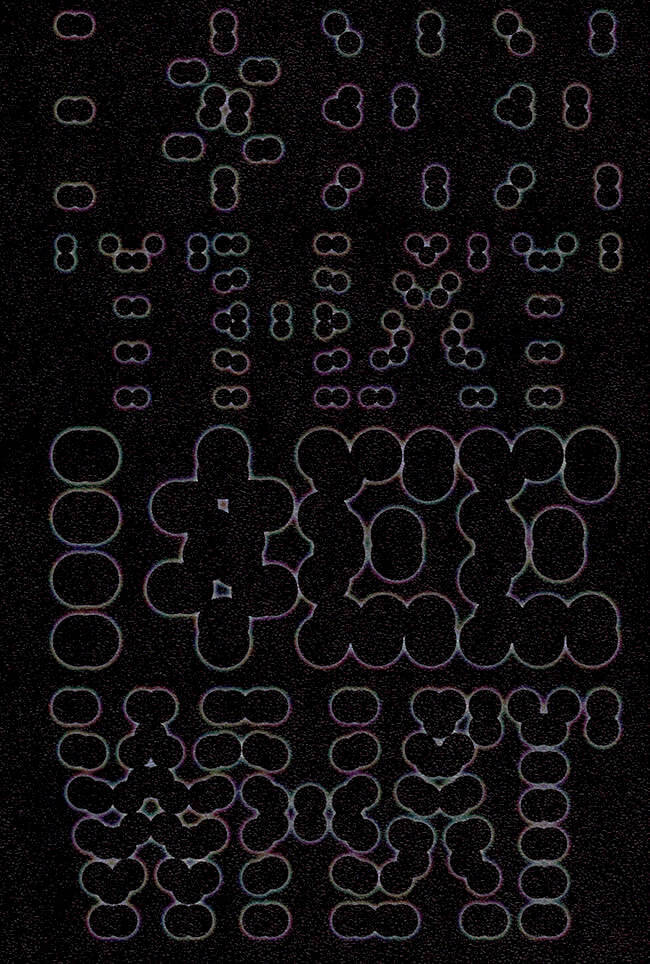
I See That I See What You Don't See
Van Westrenen F., Otero Verzier M.
This “black book” published by Het Nieuwe Instituut presents a layered, non-binary notion of darkness. Navigating through cosmic, automated, and seemingly invisible environments, it delves into what we do not generally get – or choose – to see. Moreover, the book explores the relation between the possibility of seeing and forms of oppression and emancipation. Sharp book design frames contributions by the Academy for Urban Astronauts, Ramon Amaro, Danilo Correale, Jonathan Crary, Aldo van Eyck, Ludo Groen, Bregtje van der Haak, Saidiya Hartman, Marten Kuijpers, Momtaza Mehri, Melvin Moti, Lucy McRae, Johannes Schwartz, Dirk Sijmons, and Leanne Wijnsma.
Dutch/English.
Published 2020.

Sisters of the Wind
Sisters of the Wind is the fruit of artistic research on witches, ecofeminism, and science-fiction carried out between 2018 and 2021 by Juliette Lizotte aka jujulove. It is a story that weaves through seven videos and can be experienced in different ways: an interactive audiovisual performance, an online world-building workshop and role play session, and this publication!
The publication concludes the three world-building workshops and role play sessions part of the project which took place online in February 2021 due to the COVID-19 pandemic, though they were originally intended to unfold in the form of live action role play (larp). This new constraint led us to perform the worldbuilding and role play exercises in an etherpad, an open source digital tool for co-writing text in real-time. The outcome of these sessions was archived and used as material for the publication.
This "choose-your-own adventure" story consists of three parallel worlds that were co-created during three sessions, each lasting three hours. The core of the story was similar, but the direction the sessions took were quite unique. As the story unfolds, you are asked to make decisions to travel from one world to another: creating your own version of the story by following your instinct or challenging your impulses!
Sisters.°·
The wind is returning, as it always does. Sometimes it blows so hard that it carries artifacts away from the cities it tore apart, seeds from far away places, trees that didn’t have enough time to grow stronger... That’s why you always seek a protected area to settle in, relocating as the wind comes and goes in waves. You are witches. You pay attention to the world and try to make sense of this life together through the phases of the moon from maiden to mother to crone. In your community, the feminine spirit dominates, and all gender expressions are celebrated. When your precarious life is threatened by an unsettling prophecy announcing a deadly wind that will prepare the earth for a new cycle, will you go on a journey to find the source of this wind? What will you discover on the way? How will this transform you, your sisters, and the earth forever?
Edition of 100 published by Office of Metaphors, printed in Riso in May 2021 in Amsterdam.

Why Solange Matters
Growing up in the shadow of her superstar sister, Solange Knowles became a pivotal musician in her own right. Defying an industry that attempted to bend her to its rigid image of a Black woman, Solange continually experimented with her sound and embarked on a metamorphosis in her art that continues to this day.
In Why Solange Matters, Stephanie Phillips chronicles the creative journey of an artist who became a beloved voice for the Black Lives Matter generation. A Black feminist punk musician herself, Phillips addresses not only the unpredictable trajectory of Solange Knowles's career but also how she and other Black women see themselves through the musician's repertoire. First, she traces Solange's progress through an inflexible industry, charting the artist's development up to 2016, when the release of her third album, A Seat at the Table, redefined her career. Then, with A Seat at the Table and 2019's When I Get Home, Phillips describes how Solange embraced activism, anger, Black womanhood, and intergenerational trauma to inform her remarkable art.
Why Solange Matters not only cements the place of its subject in the pantheon of world-changing twenty-first century musicians, it introduces its writer as an important new voice.

Three
S has disappeared from Ruth and Leonard's home in Brighton. Suicide is suspected. The couple, who had been spying on their young lodger since before the trouble, begin to pour over her diary, her audio recordings and her movies - only to discover that she had been spying on them with even greater intensity. As this disturbing, highly charged act of reciprocal voyeurism comes to light, and as the couple's fascination with S comes to dominate their already flawed marriage, what emerges is an unnerving and absorbing portrait of the taboos, emotional and sexual, that broke behind the closed doors of 1950s British life.
Ann Quin (1936-1973) was a working-class writer from Brighton, England. She was at the forefront of British experimentalism in the 1960s along with BS Johnson and Alan Burns. Prior to her death in 1973, she published four novels: Berg(1964), Three (1966), Passages (1969) and Tripticks (1972). A collection of short stories and fragments, The Unmapped Country (edited by Jennifer Hodgson), was published by And Other Stories in 2018. Quin's novel Berg was republished by And Other Stories in 2019, followed by Three in 2020.

Passages
A book of voices, landscapes and seasons, Ann Quin's newly republished novel mirrors the multiplicity of meanings of the very word 'passage', of music, of time, and of life itself. A woman, accompanied by her lover, searches for her lost brother, who may have been a revolutionary, and who may have been tortured, imprisoned or killed. Roving through a Mediterranean landscape, they live out their entangled existences, reluctant to give up, afraid of the outcome.
Reflecting the schizophrenia of its characters, the novel splits into alternating passages, switching between the sister and her lover's perspective. The lover's passages are also fractured, taking the form of a diary with notes alongside the entries. An intricate system of repetition and relation builds across the passages. 'All seasons passed through before the pattern formed, collected in parts.'
Ann Quin (1936-1973) was a working-class writer from Brighton, England. She was at the forefront of British experimentalism in the 1960s along with BS Johnson and Alan Burns. Prior to her death in 1973, she published four novels: Berg(1964), Three (1966), Passages (1969) and Tripticks (1972). A collection of short stories and fragments, The Unmapped Country (edited by Jennifer Hodgson), was published by And Other Stories to great acclaim in 2018. Quin's novel Berg was republished by And Other Stories in 2019, followed by Three in 2020.

I am Welton Santos.
I am Welton Santos reenacts a dialogue between the Brazilian geo-bio-architect Welton Santos and an Interviewer. The book, which is always read collectively, is used in reading performances by groups of at least 3 people.
Printed on the occasion of an artist residency at PAV, Parco d’Arte Vivente, Turin, July 2016. Texts based on transcripts of interviews with Welton Santos.

The Posttraumatic Newspaper vol.1 Inhale, Exhale
The Posttraumatic is a newspaper created by creatives and artists. [eng, cast, cat]
Why a newspaper? The project believes that a newspaper is an important link between our social reality (built over the centuries by three-headed monsters and the occasional fairy godmother) and the individuals who live in it, because it is an essential communication element and because its content is a fucking drama almost always.
When Ulrich Beck, a literate man, assures us that “the media does not respond to the inspiration of the enlightenment but to that of the market and capital” we can only read the news with a distrustful and defenseless frown. Uncle Sam manipulates us to his likings and we satisfy our appetites by feasting on his words as if they were cocaine-coated cookies that only serve to fatten the need to win over arguments at our neighbor’s dinner-table conversations. We do not know if the information we swallow is invented, bought, if they are news clippings curated by a 4channer´s paranoid imagination, or if it is an objective, absolute, eternal truth.
Based on these fatalistic, dramatic and somewhat depressing theories on news and their consumption, 39 artists were contacted and each one was granted with a space, a sort of an article, to do whatever they wanted with it. It has not been intended to generate any specific ideological discourse and there is no gift flag.
With Contributions by: Escif, Ampparito, Aida Gómez, Mas Siedentop, Jofre Oliveras, Flavita Banana, Helen Bur, Michael Beitz, Biancoshock, Milu Correch, Luce, Marta Aguilar, Jan Vorman, Igor Ponosov, Ana Vilamú, Vas Ban Wieringen, Gigi Ei, Vlady, Val Rovatti, Octavi Serra, Nicolás Garcia, Valentina and the Electic Post and Others.
Published 2021

Funeral Diva
In this collection of personal essays and poetry, acclaimed poet and performer Pamela Sneed details her coming of age in New York City during the late 1980s. Funeral Diva captures the impact of AIDS on black queer life, and highlights the enduring bonds between the living, the dying, and the dead. Sneed's poems not only converse with lovers past and present, but also with her literary forebears - like James Baldwin, Toni Morrison, Audre Lorde - whose aesthetic and thematic investments she renews for a contemporary American landscape. Offering critical focus on matters from police brutality to LGBTQ+ rights, Funeral Diva confronts the most pressing issues of our time with acerbic wit and audacity.
Poet, professor, and performer, Pamela Sneed is the author of Sweet Dreams, Kong, and Imagine Being More Afraid of Freedom than Slavery. She was a Visiting Critic at Yale, and at Columbia University's School of the Arts, and is online faculty at Chicago's School of the Art Institute teaching Human Rights and Writing Art. She also teaches new genres at Columbia's School of the Arts in the Visual Dept. Her work is widely anthologized and appears in Nikki Giovanni's, The 100 Best African American Poems.
Published October 2020
Funeral Divais the Winner of the Lambda Award for Lesbian Poetry.
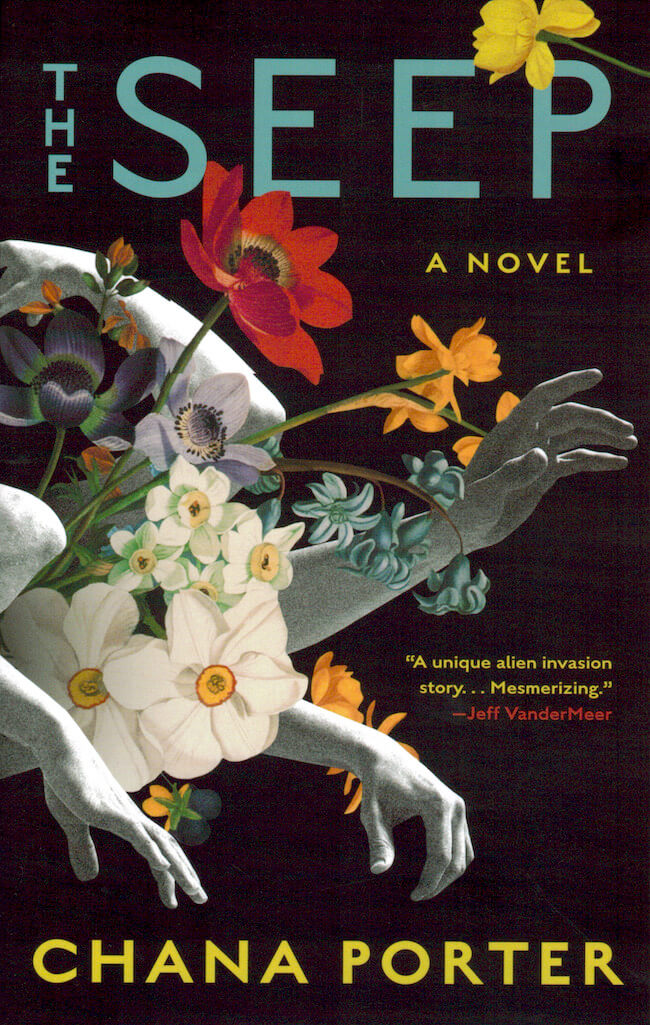
The Seep
A blend of searing social commentary and speculative fiction, Chana Porter's fresh, pointed debut explores a strange new world in the wake of a benign alien invasion.
Trina Fast Horse Goldberg-Oneka is a fifty-year-old trans woman whose life is irreversibly altered in the wake of a gentle, but nonetheless world-changing, invasion by an alien entity called The Seep. Through The Seep, everything is connected. Capitalism falls, hierarchies and barriers are broken down; if something can be imagined, it is possible. Trina and her wife, Deeba, live blissfully under The Seep's utopian influence, until Deeba begins to imagine what it might be like to be reborn as a baby, which will give her the chance at an even better life. Using Seeptech to make this dream a reality, Deeba moves on to a new existence, leaving Trina devastated. Heartbroken and deep into an alcoholic binge, Trina follows a lost boy she encounters, embarking on an unexpected quest. In her attempt to save him from The Seep, she will confront not only one of its most avid devotees, but the terrifying void that Deeba has left behind. A strange new elegy of love and loss, The Seep explores grief, alienation, and the ache of moving on.
A 2021 Lambda Literary Award Finalist.
Chana Porter is a playwright, teacher, MacDowell Colony fellow, and co-founder of the Octavia Project, a STEM and fiction-writing program for girls and gender non-conforming youth from underserved communities. She lives in Brooklyn, New York, and is currently at work on her next novel.
Published Dec 2020

touch me with your gloves i am not ready yet
Self-published poetry collection by Loïs Soleil. “Touch me with gloves, I am not ready yet” is the artist’s first poetry chapbook. It touches on subjects such as mothers, friendship breakups, surviving trauma, mental health and fuckboys.
Loïs Soleil is a Franco-Scottish artist inspired by intersectional feminism, net.art, pop culture and cultural studies. Her performances, installations and poems reveal an autobiographical directness, rawness and an emotionally vulnerable quality singular to their "hyper intimacy".
Comes in four colors: green, orange, blue and yellow.
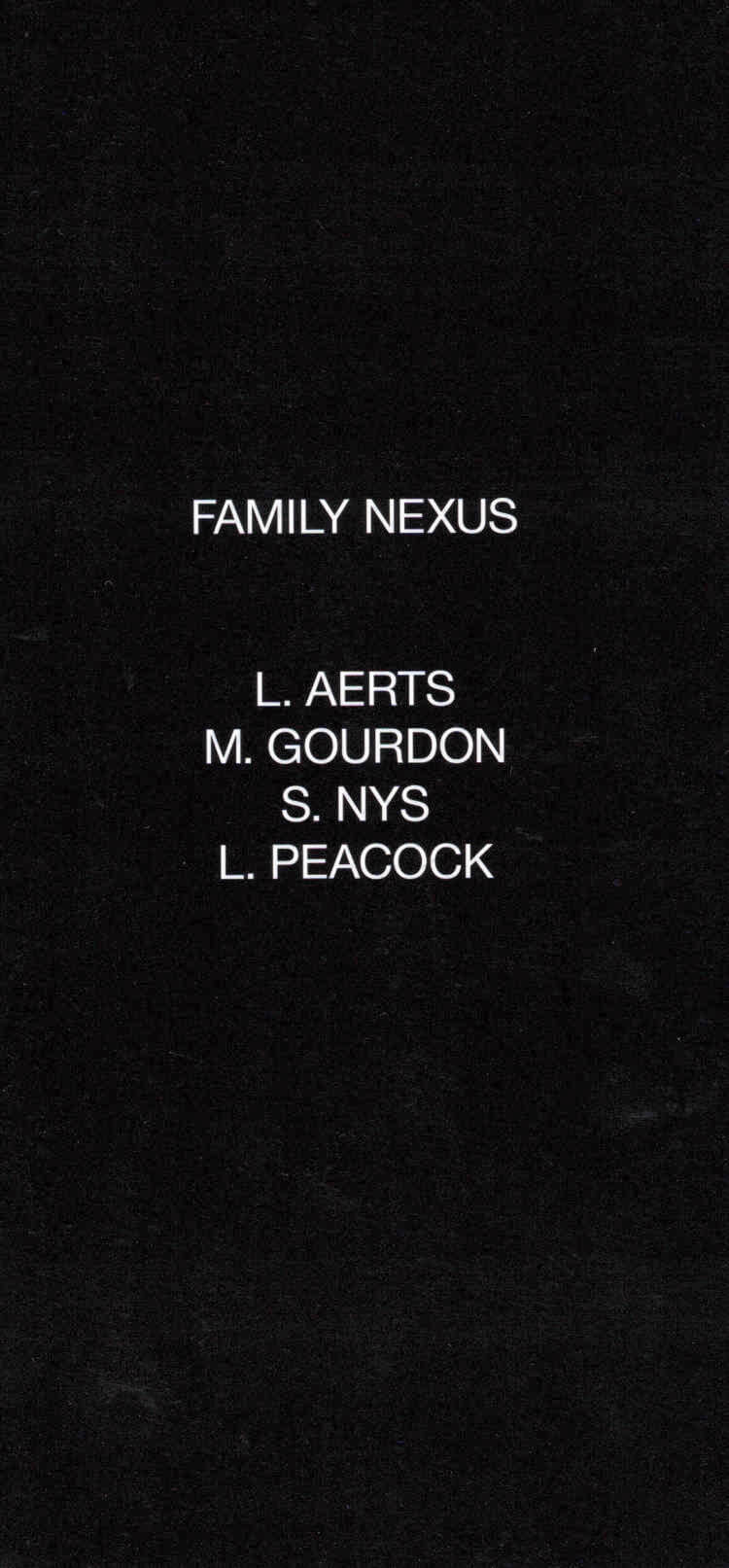
Family Nexus
Sophie Nys, Liene Aerts and 2 more
In April 2019, Sophie Nys presented the solo exhibition Family Nexus at KIOSK. In psychology, a family nexus stands for a vision that is shared by the majority of family members, often unconsciously and for several generations long, and is upheld in the context of events both within the family and in its relationship to the world. Among other, the monumental, stretched out net in the dome space was a symbol of this family dynamic.
Two years later, the theme is still working its way through the above mentioned heads. The shared interest of Nys, Gourdon, Aerts and Peacock leads to a collaboration in the form of a book that, just like the exhibition, can be read as a net of (un)coherent intrigues and knots in which no position can be neutral. They set up a network of characters. Together they represent all kinds of (human) connections. Family Nexus is a story about everyone and no one in particular. Who in this book is playing the role of the Nobody, the household’s so-called 'identified patient', or scapegoat, and which pots and pans has slipped through this character’s fingers?
Co-production: KIOSK and BOEKS.

Divided we stand, together we fall
This artist's book presents a set of photographs made by Belgian artist Sophie Nys during her stay in Zurich. It features each of the modernist fountains produced by designer Alfred Aebersold in the 1970s and scattered throughout the Swiss city. The images are associated with amusing and clever captions written by Leila Peacock, a Scottish artist living in Zurich.
In 1973, Alfred Aebersold won the competition organized by the Water Supply Department of Zurich for the design of a fountain. It was to be the visible part of a vast, autonomous and secured water supply system of 89 identical fountains distributed throughout the territory of the city. The context was that of the cold war. The threat, invisible but permanent, was the contamination of the public water supply network by an external agent. Aebersold—trained as an interior designer and founder, together with Jörg Hamburger and Herbert Merz, of studio Gruppe 3 in 1961—was representative of a Swiss design that followed the formal vocabulary of Max Bill. Bill contributed from the 1940s onward to the dissemination of ways of living and Western values to question those of Soviet ideology. Designed in the 1970s but recalling through its formal vocabulary a modernist, stable, and reassuring sculptural language expressed in the organicity and solidity of its forms, this fountain presents itself as a historical paradox of sorts. But it also presents itself as a visual symptom, set within the public space, of a necessity for a continued, ahistorical defense. The context changes, but the threat remains. And the fountain, masking its purpose in the functionality of its bowels—according to a Duchampian modus operandi, in which the sense one could assign to forms is obscured and diverted—, tirelessly spurts the purity of its liquid.

Evol/Love
Evol/Love is a project in three parts: a billboard series, installation and publication connecting 160 subtitled movie stills that all contain the word Love.
A collage of voices and definitions arranged in alphabetical order, from ‘Love is where you find it’ (A: A Date with Judy, US 1948, 00:22:37) to ‘But even if it’s a little late, love has a way of coming back to you’(Y: Yeonae/Love is a Crazy Thing, KR 2005, 01:38:02), but read backwards to sound like its antonym: evil.
Self-published: Stichting Mei, Amstelveen, NL 2020
19,6 x 19,6 x 2,3 cm
200 pages, 160 images
Japanese bound, buckram cover with flaps
Offset on pink paper (interior), screenprinted buckram (cover)
Graphic Design Vilmantas Žumbys, Vilnius
Edition of 666 copies

Electric Brine
Electric Brine is a volume of poetry and critical essays by women voices from diverse fields such as literature, geography, media studies, history of life sciences, sociology, and poetics of science and fiction, each of them central to the independent curatorial research entity The World in Which We Occur (TWWWO, 2014-ongoing) and its associated online study group Matter in Flux.
Conceived as an anthology and a register, it serves as a testimony to the initiative's long-standing work of creative adaptation and ecological inquiry through a quest to situate a vision of material politics through the lens of six punctuated pieces on flow and fluids. The literary and scientific fabulations found in these pages speak of the conjunction of lived embodiment, the materialized quality of language, and the ability to trigger political imagination through reading, writing and witnessing. Each of these strands polyperform under TWWWO, for they can be traced, retroactively, to the themes present in the live event series, to Matter in Flux's private study sessions, to the initiative's collective writing work presented in public venues and publications. Also included in this volume is an appendix documenting the years of invitation and study, intricately linked to the ideological praxis of these overlaps.
Co-founded in 2014 by Jennifer Teets and Margarida Mendes, The World in Which We Occur (TWWWO) is an independent curatorial research-based entity that collaborates with artists, scientists, science historians, philosophers, anthropologists, activists and more as it explores themes concerned with artistic inquiry, philosophy of science, and ecology. TWWWO began as a live talk-event series over the telephone and has thus expanded to other formats involving experiments with educational actions, discursive talks, and events via diverse methodologies.
Introduction by Jennifer Teets and Margarida Mendes.
Texts and contributions by Dionne Brand, Barbara Orland, Sophie Lewis, Esther Leslie, Hannah Landecker, Lisa Robertson.
Graphic design: Sophie Keij & Atelier Brenda.

Tell It to the Stones
Danièle Huillet and Jean-Marie Straub remembered quite well their first meeting in Paris in November 1954, “because that was when the Algerian Revolution began.” They often recalled this date, one that was the beginning of their fifty-year collaboration still considered to be one of the most radical and controversial oeuvres in modern cinema.
Tell It to the Stones presents artistic and intellectual responses to Huillet and Straub’s filmmaking methods and body of work. The book stems from a prolonged public program presented at the Akademie der Künste, Berlin, consisting of concerts, public conferences, a three-month exhibition, and a complete cinema retrospective.
Contributing artists, scholars, filmmakers, and writers, some of whom were long-time collaborators of Straub and Huillet, as well as younger artists and writers from various disciplines call upon this collective experience in new texts, revised transcripts, conceptual essays, and visual montages—taking seriously what Huillet once requested from the audience: “to help us build the in-between.” This volume is not only concerned with a general appreciation of Straub and Huillet’s cinema practice but also recognizes their substantial contributions to other arts and political thought. Presented are new readings of their literary references―Sophocles, Hölderlin, Mallarmé, Kafka, Pavese, and Brecht, among others—and also musicological and philosophical reflections on their preoccupation with Arnold Schoenberg; essayistic excursions to sites of their films; critical acclaim of their unflinching yet often misunderstood political stances; close readings of some of their most influential and radical films enriched by insights into the processes of their production. Tell It to the Stones reanimates these encounters and emphasizes how Straub and Huillet’s oeuvre still matters today, perhaps more than ever.

Politics of Food
This publication critically assesses and illuminates ways in which the arts can confront food-related issues, through the contributions of artists, anthropologists, activists, agronomists, and chefs.
The last decade has witnessed a proliferation of artists and artist collectives interrogating the global politics and ethics of food production, distribution, and consumption.
As an important document of new research and thinking around the subject, this book, co-published with Delfina Foundation, contains reflections on food by prominent artists, anthropologists, and activists, among others. Interviews with chefs, policy makers, and agronomists critically assess and illuminate the ways the arts confront food-related issues, ranging from the infrastructure of global and local food systems, its impact on social organization, alternatives and sustainability, climate and ecology, health and policy, science and biodiversity, and identity and community.
Contributions by Kathrin Böhm, Center for Genomic Gastronomy, Leone Contini, Cooking Sections, Chris Fite-Wassilak, Amy Franceschini & Michael Taussig, Fernando García-Dory, Melanie Jackson, Dagna Jakubowska, Nick Laessing, Jane Levi, Candice Lin, Poppy Litchfield, Christine Mackey, Taus Makhacheva, Elia Nurvista, Senam Okudzeto, Thomas Pausz, Daniel Salomon, Vivien Sansour, Standart Thinking, Serkan Taycan, Lantian Xie, Raed Yassin.
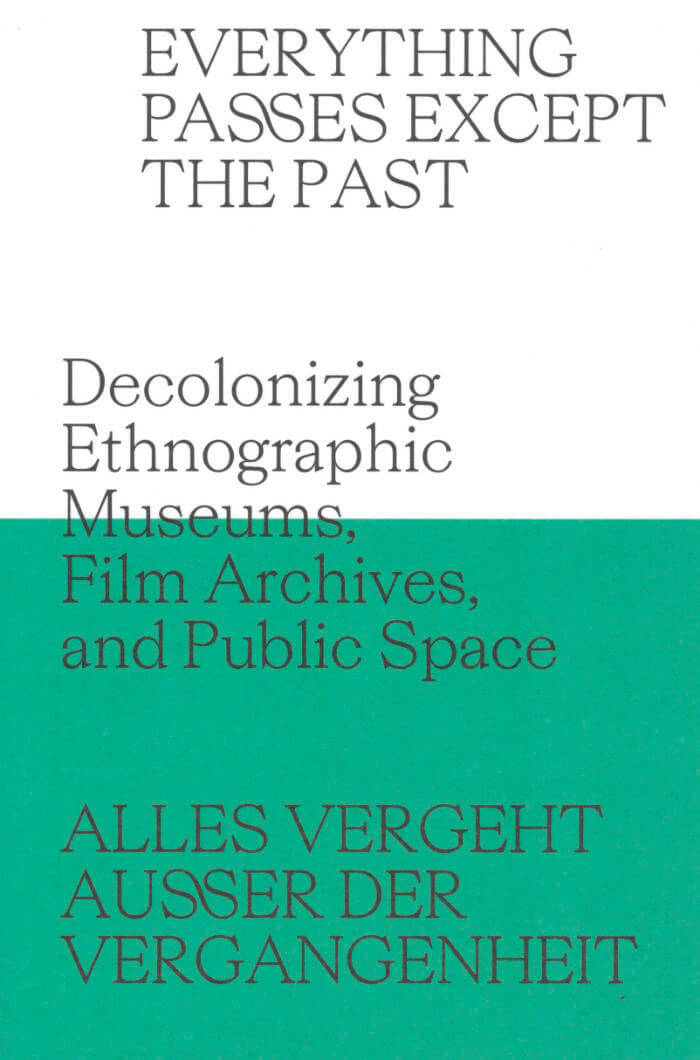
Everything Passes Except the Past – Decolonizing Ethnographic Museums, Film Archives, and Public Space
Everything Passes Except the Past takes an artistic and discursive approach to coming to grips with a colonial past that remains present in ethnographic museums, public space, and image archives.
The contributions in this book propose visionary theoretical, practical, and ethical foundations for future museums based on artistic and curatorial remediation of ethnographic collections. They also cover the role of colonial films in our collective and national memory, as well as the challenges and perspectives of tearing down or replacing monuments and renaming streets.
Contributions by Yaa Addæ Nantwi, Lotte Arndt, Andrés Antebi Arnó, Bianca Baldi, Daniel Blaufuks, Filipa César, Didi Cheeka, Clémentine Deliss, Karfa Diallo, Sally Fenaux Barleycorn, Alessandra Ferrini, Fradique, Pablo Gonzáles Morandi, Guido Gryseels, Jana J. Haeckel, Didier Houénoudé, Duane Jethro, Christian Kopp, Yann LeGall, Alberto López Bargados, Eloy Martín Corrales, Grace Ndiritu, Inês Ponte, Linda Porn, Tamer El Said, Bénédicte Savoy, Stefanie Schulte Strathaus, Mnyaka Sururu Mboro.
Graphic design: Caroline Wolewinski.
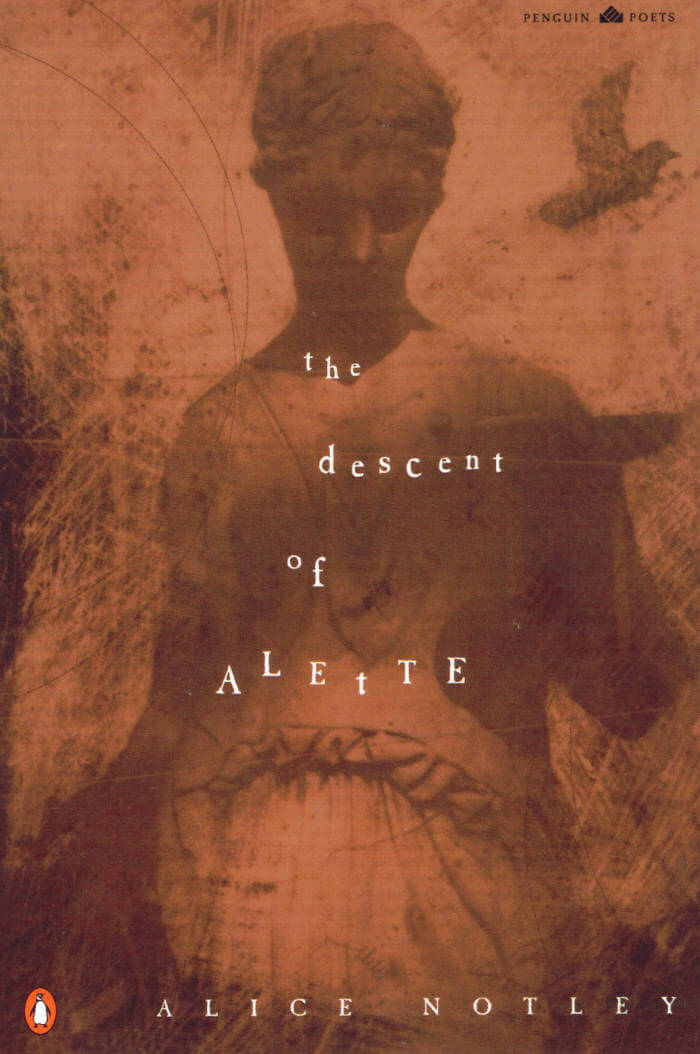
The Descent of Alette
The Decent Of Alette is a rich odyssey of transformation in the tradition of The Inferno. Alice Notley presents a feminist epic: a bold journey into the deeper realms. Alette, the narrator, finds herself underground, deep beneath the city, where spirits and people ride endlessly on subways, not allowed to live in the world above. Traveling deeper and deeper, she is on a journey of continual transformation, encountering a series of figures and undergoing fragmentations and metamorphoses as she seeks to confront the Tyrant and heal the world. Using a new measure, with rhythmic units indicated by quotations marks, Notley has created a spoken text, a rich and mesmerizing work of imagination, mystery, and power.
Alice Notley is a poet whose twenty previous titles include The Descent of Alette, Beginning with a Stain, Homer's Art, and Selected Poems. She wrote the introduction for her late first husband Ted Berrigan's Selected Poems. She lives in Paris.
Published 1996.

What Is? - Nine Epistemological Essays
In WHAT IS?, Drucker traces the invisible thread that links letters to writing to books to the digital age. In so doing, she makes sense of emerging technology and the way it has insinuated itself into the culture of book making, writing, and reading. Drucker's grand arguments are based on modest means. In this case she is starting with the humble letter. But, by probing the philosophy of language as well as the rhetoric of art, she builds toward a broader picture. In the end, her investigation concludes with nothing less than a new understanding of digital materialism.
Johanna Drucker is the inaugural Breslauer Professor of Bibliographical Studies in the Department of Information Studies at UCLA. She is internationally known for her work in the history of graphic design, typography, experimental poetry, fine art, and digital humanities. In addition, she has a reputation as a book artist, and her limited edition works are in special collections and libraries worldwide. Her most recent titles include SpecLab: Digital Aesthetics and Speculative Computing (Chicago, 2009), Graphic Design History: A Critical Guide (Pearson, 2008, 2nd edition late 2012), and WHAT IS: NINE EPISTEMOLOGICAL ESSAYS (Cuneiform Press, 2013). She is currently working on a database memoire, ALL, the online Museum of Writing in collaboration with University College London and King's College, and a letterpress project titled Stochastic Poetics. A collaboratively written work, Digital_Humanities, with Jeffrey Schnapp, Todd Presner, Peter Lunenfeld, and Anne Burdick was published by MIT Press in 2012.

Nonbinary: A Memoir
A revealing and beautifully open memoir from pioneering industrial music artist, visual artist, and transgender icon Genesis P-Orridge.
In this groundbreaking book spanning decades of artistic risk-taking, the inventor of "industrial music," founder of Throbbing Gristle and Psychic TV, and world-renowned fine artist with COUM Transmissions Genesis P-Orridge (1950-2020) takes us on a journey searching for identity and their true self. It is the story of a life of creation and destruction, where Genesis P-Orridge reveals their unwillingness to be stuck, stuck in one place, in one genre, or in one gender. Nonbinary is Genesis's final work and is shared with hopes of being an inspiration to the newest generation of trailblazers and nonconformists.
Nonbinary is the intimate story of Genesis's life, weaving the narrative of their history in COUM Transmissions, Throbbing Gristle, and Psychic TV. It also covers growing up in World War II's fallout in Britain, contributing to the explosion of new music and radical art in the 1960s, and destroying visual and artistic norms throughout their entire life.
In addition to being a captivating memoir of a singular artist and musician, Nonbinary is also an inside look at one of our most remarkable cultural lives that will be an inspiration to fans of industrial music, performance art, the occult, and a life in the arts.
Hardcover edition 2021.